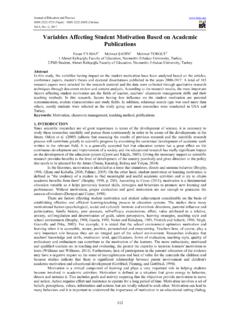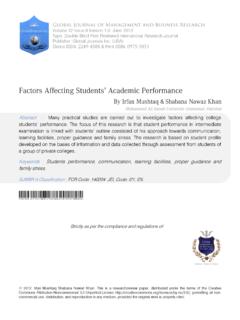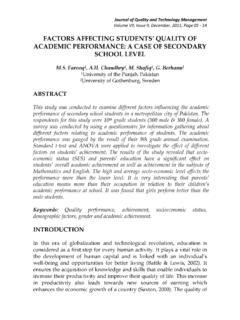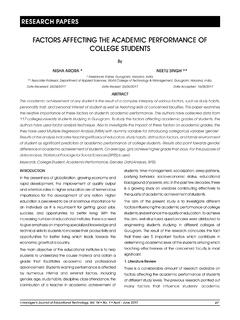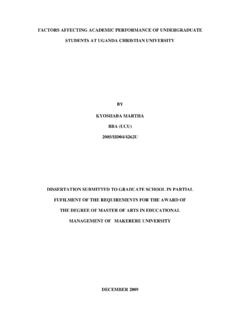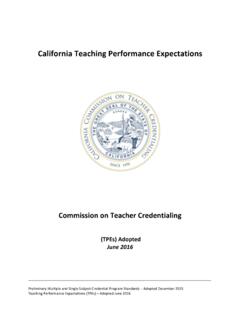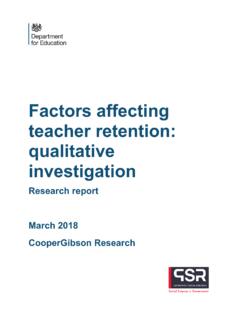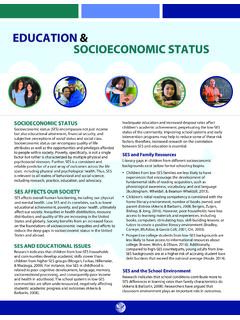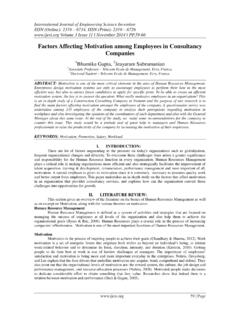Transcription of Home environmental factors affecting students’ academic ...
1 RURAL ENVIRONMENT. EDUCATION. PERSONALITY Jelgava, 7 2014. 141 Home environmental factors affecting students academic performance in Abia State, Nigeria Anthonia PhD Department of Home Economics, Hotel Management and Tourism Michael Okpara University of Agriculture Umudike, Abia State Nigeria Abstract: The study determined some home environmental factors affecting the academic performance of students in Abia State, Nigeria. Survey research design was adopted for the study. Three research questions guided the study. The data were generated using structured questionnaire. A sample of 200 respondents from both junior and senior secondary school students and their parents were drawn through simple random sampling technique from secondary schools in the study area. Descriptive statistics example frequency, percentage and mean were used to analyze the data collected.
2 The finding of the study revealed among others that none provision of adequate educational material by parents and non- cha-lant attitudes of some parents towards the education of their children as well as the socio- economic status of the student s family, all affect the students academic performance. Also revealed by the study are possible way of amelioration which among others includes giving proper orientation to the parents, on the implication and consequences of the type of family they may decide to adopt on the child s overall being especially the child s academic performance. Based on the findings it was recommended that parents no matter their busy schedule should make out time to sit down with their children or wards and check their children s academic work, direct them where necessary, discuss the academic problems of their children with their teachers or school guidance counselors so as to detect the students problem early enough and tackle it before it affects the students .
3 Keywords: Home environment, factors , academic Performance Introduction A home is a place where one lives permanently, especially as a member of a family or household. It is a place of residence or refuge. A home is not a mere transient shelter. Its essence lies in the personalities of the people who live in it. Home Environment is the surroundings, where one live. According to (Anene, 2005) environment is the aggregate of all internal and external conditions affecting the existence, growth and welfare of organisms. It is an influence an individual came in contact with after the hereditary has been through the gene plasma. explained that environment can be divided into physical, social and abstract environment. Physical environment is the objects or materials found in the home, school or community. It also includes the people like parents, siblings and peers (Anene, 2005).
4 She also explained that the social environment is the social life, societies and club affecting the individual. Abstract environment is the reactions, feedback and the responses received on interactions with others. The author further explained that environment can also be classified as urban or rural environment. The focus of this study is on the home environmental factors affecting the academic performance of the students . This therefore, entails the objects, materials, parents, siblings, peers and social life that exists in the home in which the students find himself/herself. All the variables in the home that affect a person s existence, behavior and performance constitute the home environmental factors . academic Performance on the other hand is the outcome of education; it is the extent to which a student, teacher or institution has achieved the educational goals.
5 According to , , and (Bossaert, , 2011) academic achievement is commonly measured by examination or continuous assessment; however, there is a general agreement on how it RURAL ENVIRONMENT. EDUCATION. PERSONALITY Jelgava, 7 2014. 142 is best tested. In some countries, the achievement of school is measured by the academic performance index. In Nigeria, academic performance is measured majorly by the student s performance in external examinations like WEAC Examinations both Senior and Junior WEAC, NECO examinations and JAMB examinations. (Chukwudi, 2013) discovered that individual differences in academic performance have been linked to differences in intelligence and personality. He explained that students with higher mental abilities as demonstrated by IQ test (quick learners) and those who are higher in conscientiousness (linked to effort and achievement motivation) tend to achieve highly in academic settings.
6 Early academic achievement enhances later academic achievement. However, a number of factors contribute to that. It has also been discovered that certain factors can either influence or hinder the academic performance of students at any level of education. Such factors emanating from the school environment, curriculum planning and implementation, siblings/ Peer group influence, Home Environment eg parents, socialization patterns in the home, location of the home, modern gadgets at home and so on. The target of this study is on home environmental factors affecting the academic performance of students . The student s home environment can either accelerate or hinder a student s academic performance. A home has earlier been defined as a place of residence or refuge when it refers to a building.
7 It is usually a place in which an individual or a family can live and store personal property. (Magnuson, 2007) pointed out that parent s academic socialization is a term describing the way parents influences student s academic achievement by shaping students skill, behaviors and attitude towards school. He further explained that parent s influences student through the environment and discourse parents have with their children. This means that academic socialization can be influenced by parent s social economic status. Thus highly educated parents tend to have more stimulating learning environments. and (Ajila, Otutola, 2000) stated that parent of all classes realized the importance of education. They also pointed out that different families create environment that influences children s intellectual growth and educational motivation in different ways.
8 The function of the family among others includes rearing, protecting and educating the children and such function can be performed in the home, thus a home is an essential agent of education. Home environments influence adolescents aspiration. The social upbringing of the child begins from home (family). It is the home that makes the child to identify himself with the society, culture, religion or social class. Thus the home continues to exercises a strong influence over the child s live and academic performance in the school. It has to be noted that homes differ in terms of their significances in the social orders. For instance, some have more prestige, money etc. while some have wider experience and knowledge of how to operate within the society or school environment. (Anene, 2005) stated that the home is the single most significant environmental factor in enabling children to develop the trust, attitude and skills that will help them to learn and engage positively with the world- a process that starts at birth, if not before.
9 It is the foundation from which babies and young children and youths can grow to achieve their full potential. Good home learning environment provides the love, security, simulation, encouragement and opportunities that help children to flourish. The quality of parent-child relationship is fundamental to children s longer term development. Warmth, encouragement and an absence of hostility are key element in positive home environment. (Nanalee, 1997) pointed out that as children grow beyond babyhood, a positive home learning environment provides social interaction, attention and activities which promote the development of positive attitudes to learning, as well as the acquisition of physical, intellectual, language, social and emotional skills. The amount that parents talk to babies and young children and the way they talk to them have been shown to have a direct positive impact on children s linguistic and intellectual ability.
10 At the age of 3 and 10 parents can provides the building blocks for literacy and cognitive development by; chatting as much as possible during normal daily life, using a wide vocabulary praising rather than criticizing, talking to children about things, using language with a high information content, giving children choices rather than simply directing them, listening and RURAL ENVIRONMENT. EDUCATION. PERSONALITY Jelgava, 7 2014. 143 responding to what children say. Research has established that parents socio-economic background, including education and income, has a substantial impact on children s outcomes. Ample evidence also documents the influence of parenting behaviors on children s development from babyhood to late adolescence. It is not out of place to imagine that the type of family, parents level of education and their socio economic background can have possible effects on the academic performance of children in school.


